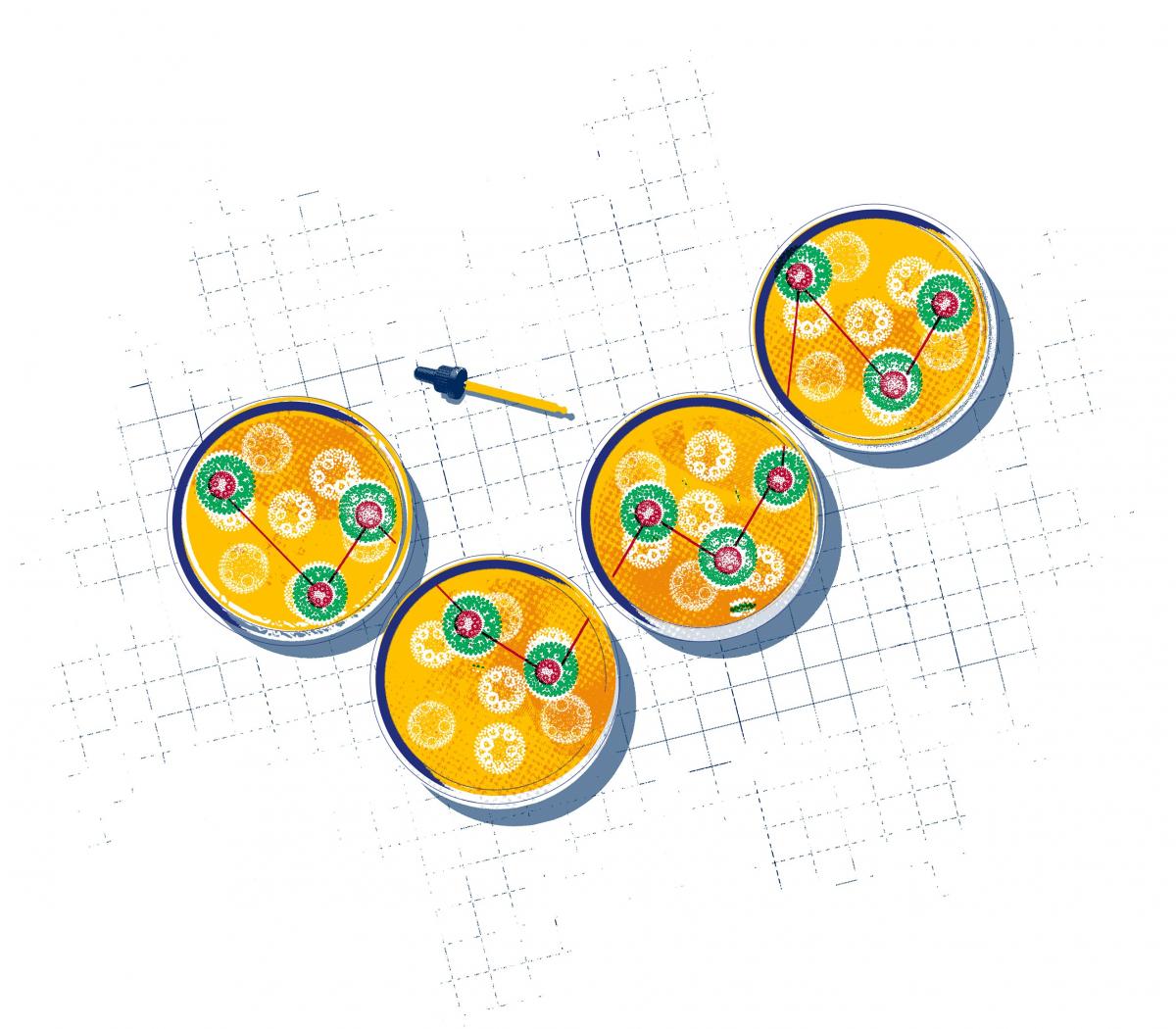Will exercise help prevent colorectal cancer from coming back? Can a new blood test for DNA markers predict which prostate cancer patients will be helped most by experimental targeted therapies? Is it safe for young women with breast cancer who wish to become pregnant to temporarily interrupt endocrine therapy to try to have a baby? Will a new four-drug combination save the lives of more pancreatic cancer patients after surgery?
The Canadian Cancer Trials Group (CCTG), headquartered at Queen’s University, asks and finds evidence-based answers to critical questions about the best treatment options for the 225,000 Canadians diagnosed with cancer each year. Innovations proven to be effective through CCTG led clinical trials have set new standards of care that guide treatment decisions for patients today and tomorrow: curing disease, preventing recurrence, saving lives, and improving quality of life.
International network & diverse trials
Since its inception in 1980, CCTG has grown and evolved into the leading international cooperative clinical cancer research network, with over 85 Canadian member institutions and 2,100 investigators, who have facilitated over 500 trials in collaboration with 700 international centres in 40 countries. CCTG is a national program of the Canadian Cancer Society and is also the only non-American partner of the US National Clinical Trials Network. Its clinical trials have expanded well beyond testing new and approved drugs for different cancer treatments into investigating how radiation, surgical, exercise, dietary, and smoking cessation interventions can boost patient outcomes and quality of life.
"Our mission is to find new drug and non-drug interventions that benefit patients most in terms of improving outcomes, safety, convenience, and quality of life. In many cases, the results of our trials have changed practice in Canada and worldwide," says Dr. Janet Dancey, CCTG Director and professor in the Queen’s Department of Oncology. As Canada’s first and largest cancer research network, CCTG has had a direct impact on improving treatment option for patients over the last forty-plus years. Two highly influential studies from the past illustrate how CCTG-led international trials have continuously changed practice over four decades to benefit all cancer patients.

Probing and proving which promising innovative treatments work
CCTG is conducting an innovative clinical trial that uses liquid biopsies – rather than invasive tissue biopsies – to screen for DNA markers in blood to help predict which of five new experimental therapies is likely to work best for individual patients with advanced prostate cancer. It is the first precision medicine trial for prostate cancer in the world to use liquid biopsies for genomic testing. Because the genetic makeup of metastatic prostate cancer differs greatly between patients, targeting each drug to match the specific genetic vulnerabilities of each patient’s tumour means more patients are likely to respond to treatment than if all were given the same drug.
Certain immunotherapy drugs, called immune checkpoint inhibitors, have been effective in treating cancers such as lung cancer and melanoma, but have failed to help most patients with advanced colorectal cancer. A 2019 CCTG phase two trial is the first to show that combining two immune checkpoint inhibitors – Imfinzi and tremelimumab – extends the lives of people whose colorectal cancer was thought to be resistant to immunotherapy. These results will be validated in a larger phase three trial.
Rare cancers account for about 25% of all cancer diagnoses and deaths. CCTG researchers are leading an international clinical trial with co-investigators from Italy, France, and the United Kingdom to test whether Pembrolizumab therapy (another immune checkpoint inhibitor) – alone, or with chemotherapy – extends the lives of patients with malignant pleural mesothelioma, a rare and aggressive cancer mainly caused by inhaling asbestos.
Changing practice globally
Exciting results from two recent CCTG trials have changed treatment practice for some very challenging cancers. Dr. Jim Biagi, a Queen’s cancer researcher and medical oncologist, was Canadian co-chair of an international trial that showed a doubling of the survival rate for pancreatic cancer patients who received a new four-drug chemotherapy combination – mFOLFIRINOX – after surgery, compared with those who received the standard treatment. The results of this ground-breaking trial, conducted with a research group in France, were reported in The New England Journal of Medicine (NEJM) in 2019.
CCTG led another international clinical study, published in NEJM in 2017, demonstrating that adding an oral chemotherapy (temozolomide) to a shorter course of radiation for older patients with glioblastoma (brain cancer) reduced the risk of death by 33%, without compromising quality of life.
Most recently, CCTG's SC24 trial results were presented to an international gathering at the American Society for Radiation Oncology (ASTRO) Annual Meeting and are set to change practice globally. Radiation therapy is commonly used to relieve the pain of metastases to the spine, by shrinking the tumors and reducing inflammatory cells. This Canadian study showed that using fewer and higher doses of precisely delivered radiation therapy is more effective than standard treatment with twice as many patients reporting an enduring, complete control of pain. This is an important outcome as patients with uncontrolled pain have poor quality of life. This treatment will be the new standard option to help patients live with less pain.
Lifestyle interventions to beat cancer
Can exercise prevent colorectal cancer recurrence? Dr. Chris Booth, Canada Research Chair in Population Cancer Care and a Queen’s researcher and oncologist, is principal investigator for the CCTG-led CHALLENGE trial, which includes participants from Canada, the U.S., Australia, Israel, and South Korea. It is the world’s first clinical trial to examine whether a structured exercise program – 150 minutes a week – prevents relapse and boosts survival for high-risk colorectal cancer patients after completing surgery and chemotherapy.
![[Photo of a cancer cell from CCTG Tissue Bank]](/research/sites/default/files/assets/featured_story/Callahan2019.jpg)
Art of Research Photo: Immunofluorescence Stain by Shakeel Virk and Lee Boudreau, CCTG Tissue Bank
Less treatment, more quality of life
![[Illustration of a traffic light]](/research/sites/default/files/assets/stop_light.jpg) CCTG researchers are also investigating new ways of modifying or reducing cancer treatment safely to enhance patients’ quality of life. If a pre-menopausal woman diagnosed with early-stage breast cancer, who wishes to become pregnant, waits for five to 10 years of endocrine therapy before trying to have a baby, her chances of conceiving and giving birth will be much lower. The CCTG POSITIVE study, which includes women from 20 countries, is evaluating whether interrupting endocrine therapy for up to two years to permit pregnancy increases the risk of breast cancer recurrence – and, if not, will open a safe, optimal window for pregnancy sooner.
CCTG researchers are also investigating new ways of modifying or reducing cancer treatment safely to enhance patients’ quality of life. If a pre-menopausal woman diagnosed with early-stage breast cancer, who wishes to become pregnant, waits for five to 10 years of endocrine therapy before trying to have a baby, her chances of conceiving and giving birth will be much lower. The CCTG POSITIVE study, which includes women from 20 countries, is evaluating whether interrupting endocrine therapy for up to two years to permit pregnancy increases the risk of breast cancer recurrence – and, if not, will open a safe, optimal window for pregnancy sooner.
Another CCTG-led international trial is using biomarkers to help evaluate whether not giving women with low-risk, node positive breast cancer radiotherapy to the chest wall and lymph nodes after breast surgery works as well as standard care (which includes radiotherapy) at preventing breast cancer from coming back.
CCTG has become a leader in facilitating wide-ranging trials that address and advance the full spectrum of cancer treatment, prevention, and care. This results, in part, from its depth and breadth of experience in collaborating with top clinical trial groups internationally – a competitive advantage and necessity due to Canada’s small population. “We have many first-class cancer research investigators in this country. Our impact is much greater worldwide, however, because of our ability to collaborate well and successfully with each other, and with clinical research groups in many other countries,” says Dancey.
Cancer Research Institute
Founded in 2001, the Queen's Cancer Research Institute (QCRI) has grown into the largest research concentration in the Faculty of Health Sciences.
Research at the 60,000-square foot facility ranges from population studies of cancer etiology, through tumour biology and clinical trials, to outcomes, and health services research. The QCRI is committed to improving cancer control through research that spans disciplines and investigates connections among fundamental, clinical, and population research.


![[Photo of Janet Dancey]](https://www.queensu.ca/research/sites/default/files/assets/featured_story/JaneyDancey-500x300_1.jpg)
